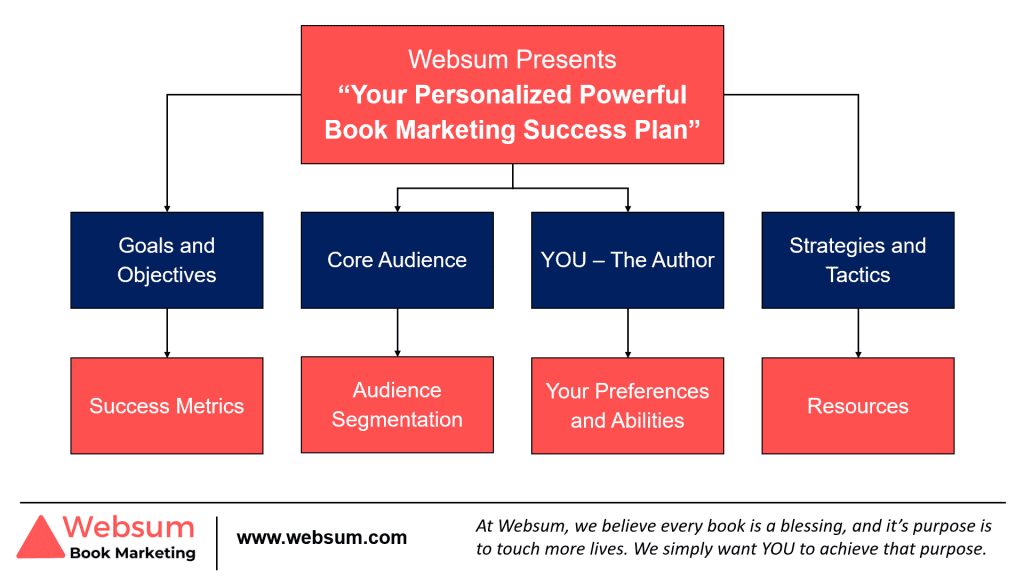Book Marketing Plan is an absolute essential in every author’s kit. An author without a good plan just bumbles around from one technique to another without ever reaching concrete success.
On the flip side, an author with a book marketing plan significantly increases their chances of achieving desired results.
Every author is unique. Every book is unique. Therefore, every book marketing plan needs to be tailored to suit the author’s needs and objectives.
At Websum, we build personalized, powerful book marketing success plans.
We take the holistic approach and look at everything – your book, your audience, you as the author, your personal strengths, your personal weaknesses, your goals and objectives, resources required to build your powerful book marketing success strategy, resources you have at your disposal, resources you will need to acquire to bring your strategy to life, and much more.

Book Marketing is simple in our understanding. It’s a two-step plan.
- Build a community of readers
- Feed that community with continuous, unconditional love
It’s the “HOW” that makes it complex and difficult for most authors.
How do you build a community of readers? Where do you build it? Do you build it on Facebook? Instagram? Twitter? Through your email marketing database?
How do you feed the community with love? Do you post social media updates? Send email newsletters? Do live video chats? Email them one at a time, telling them how grateful you are?
Too many options, and ideas-without-context throw most authors off their marketing game.
Every author wants to market their book. But when marketing becomes overwhelming, authors back-off and say things like …
I don’t like marketing. I prefer writing better.
Allow Websum to present you with a holistic book marketing approach that is powerful and personalized to your needs.
Most book marketing plans strictly focus on strategies and tactics. We don’t.
Book Marketing Plan Structure
- Goals and Objectives
- Success Metrics
- Your Core Audience
- Questions to build your audience persona
- Sources for audience persona
- Why should you define your core audience?
- Audience Segmentation
- Marketing with context
- You – The Author
- Book Marketing Strategies, Tactics and Ideas
- Book marketing strategies for community building
- Book marketing strategies to love, strengthen and grow your community of readers
- Resource Inventory
- Putting the Book Marketing Plan together
Goals and Objectives

The first thing we focus on are your goals and objectives. We ask you questions such as:
- How many books would you like to sell?
- In what time frame?
- Is this a single book, or a part of series?
- Do you intend to build a business out of these books in future?
And, we do not accept vague answers such as, “I’d like to sell as many books as possible.”
Once you have your major goals determined, break them down into three to five major milestones.
For example, if your goal is to sell 1,000 books in a 12-month period. Maybe your major milestones could be … 250 books each quarter.
Once you have the major milestones set in, break them up into minor milestones (monthly in this case). So the minor milestones could be … 85 books a month.
Success Metrics
Next, we help you define your success metrics.
Every plan needs defined success metrics. If you don’t have it, how do you know the plan worked? How can you tell it succeeded? You can’t. Defined success metrics are crucial for any plan’s success.
Understand this: A well stated objective is often a success metric in itself.
Your Core Audience

So, now we know what you want (goals and objectives), and how success looks like (success metrics).
But we need people to buy your books in order to achieve your goals. Question is … who are these people that will buy your book?
The wrong answer is “Everyone.” If you’re writing a book about career transitions, everyone will not buy your book. Because, senior citizens clearly don’t need your book, and neither do children.
Instead, what you want to do is build an “Audience Persona”.
Questions to build your audience persona
- How old is my idea audience?
- What is their gender?
- Where do they live?
- What books do they read?
- What magazines do they subscribe to?
- Do they actively seek ways to further their education?
- What conferences do they attend to?
I know this can be overwhelming. But there are a couple easy sources where you can find these answers.
Sources for audience persona
- Interview people who buy your books. Talk to a fairly large sample (100 or so) and ask them a set of predefined questions. Then find commonalities between them. The commonalities are what will build your core target audience.
- Look at “Insights” on your social media platform. They will tell you whether your fans and followers are male or female, what age group they belong to, where do they live, etc.
- Install “Google Analytics” on your website to receive this type of data. Google Analytics is a free tool that captures visitor data (people who visit your website).
Why should you define your core audience?
While defining your audience persona …
- Gives you greater control over your marketing activities
- Gives you a greater return on your time and money
- Makes results predictable.
There is a bigger benefit. It allows you know know the different stages a potential reader goes through before they purchase your book, and also tells you what they do after they purchase your book.
This is crucial because it allows you to segment your audience.
Audience Segmentation

Audience segmentation is understanding your “Reader’s Journey” and identifying the various stages of the journey.
- How stages does a reader go through from first discovering you, to being your die-hard fan?
- What do they experience at each stage?
- How do they feel about you at each stage?
- What could happen that would take them away from you and set them on a different path?
- If that happens, What can you do about it to bring them back on the “path to your fandom”?
- When do they buy the book?
- Do they spread the word about you?
- If so, how do they do it?
As you discover various stages of the user’s journey, write them down. Because your marketing will need to be customized for each stage.
Marketing with Context
When you segment your audience into groups, you can market better.
It allows you to send “Hi, my name is ABC and I write XYZ kind of books. If you like THIS author, you will love my books too.” type of messages to new audience only.
It also keeps you from sending “I know you loved my last 6 books. My book #7 release next month. I hope you’re as excited as I am.” to people who are unfamiliar with your work.
The geeky term for this is “Contextual Marketing”.
When you go to Amazon, the homepage is customized to your preferences. When I go to Amazon, the homepage is customized to my preferences. Why does Amazon do this? To improve the experience but more importantly this creates a feeling of “care” in our minds. We reciprocate with showing our loyalty and spending money on the site.
YOU – The Author
Building an powerful book marketing plan involves you just as much as it involves your book and your audience.
People buy books when they connect with either the book or the author. You are an extremely important part of the puzzle.
Here’s an expert tip:
When people connect with you, the book becomes an easy sell.
Mayur Gudka
List down the following things about you, and I’ll tell you why in a moment:
- your habits (good and bad)
- your preferences
- your skills
- your talents
- your marketing know-how
- your technological experience
- how you connect best with people
Here’s why:
It will allow us to determine which marketing activity is best suited for you and your needs.
If you are okay being on video, tactics like Facebook Live & YouTube video can work to your advantage.
If you hate being on video, but don’t mind talking to people at lengths, a podcast maybe a better marketing vehicle for you.
If you don’t like social media but you connect with people better in-person, maybe doing a lot of library events, book expos and conferences maybe be better way to build your community.
Listing your habits, preferences and skills and talents helps you become a marketing powerhouse because now you’re operating in an environment you’re most comfortable in.
Mayur Gudka
Now that we’re clear on your objectives, success metrics, who your audience is, what their journey looks like and your personal strengths and weaknesses, let’s take a look at the actual marketing strategies and tactics best suited for your needs.
Book Marketing Strategies, Tactics and Ideas
There are countless book marketing strategies and tactics you can use to build your community and then shower them with unconditional love.
Before you decide to employ a certain strategy, be very clear on the following:
- How will this particular strategy help you with your goals and objectives?
- What do you intend to get by employing this strategy?
- Does this strategy align with your strengths?
- Will you see results in the time-frame you need to achieve your goals?
Your plan should only include the ones you will be most comfortable executing. Also try and remember the purpose of each marketing activity you perform.
Will it help you build your community? Will it help you shower love on your community? If the answer is no for both, you don’t need to do it.
Here’s a gentle reminder. Be intentional about your actions.
Intentional actions create intended results.
Mayur Gudka
Book marketing strategies to build a community
- Create and develop a powerful social media presence
- Populate all fields of your social media profile for search engine optimization effectiveness
- Be consistent with your profile (colors, text, words) throughout all social media channels and other online profiles including your website.
- Register with an email marketing service and populate it with readers’ email addresses
- Keep a sign-in sheet with you at all events. It should ask for reader’s name and email addresses.
- Create a library of amazing content and make it available for free. Use SEO (search engine optimization) and social media to spread the word.
- Be a guest speaker at library events, expos and conferences
- Use other people’s audiences to create your own audience
- Create contests with built-in viral mechanisms.
Book marketing strategies and ideas to love, strengthen and grow your community of readers
- Post daily updates on social media. Updates can take many forms. They can be
- just plain old couple lines of text, or a paragraph or two
- graphical quotes,
- book cover mock-ups,
- your book writing process,
- updates about how far along you’re in writing a book,
- asking for reader suggestions
- videos
- poll question
- Create Live videos on social media. Live videos are an amazing way to attract new readers to your community. Many social networks including Facebook, LinkedIn, and Instagram will let you create Live Videos.
- Create an automated email marketing series to introduce yourself and your books to new readers that join your email newsletter.
- Send weekly email newsletter with multiple segments and encourage readers to forward it to anyone else who may enjoy it.
- Create free content for readers to download (in exchange for an email address, or not).
- This can be short stories, free books, deleted scenes (chapters that didn’t make it in final edit of the book), copy of the first draft of a novel, etc.
- Publish this content at as many places as possible and in as many forms as possible (video, audio, text, graphics, presentations, etc.)
- Speaking at in-person events is an amazing way to build trust and develop your reader’s network.
- Always make sure to carry an email sign-up sheets at such events.
- Carry freebies with you too.
- If you’re carrying printed short stories, at the end of the story say something like, “Send an email at ABC@XYZ.com to get 2 more free short stories”. This is another method to capture email addresses.
- Write articles related to your subject on other people’s websites or newsletters. Make sure there is a link pointing people back to your site or email newsletter.
- Find book reviewers and ask them to review your books. They usually have a following who you can tap into and bring them into your universe.
- Create contests or challenges that allow people share the contest or challenge. Make it such that with each share, they get an extra entry into the contest. As a consequence, more people they share it with, higher the chances of their winning. You’re basically creating a win-win situation for all parties involved.
I hope you use these strategies and add your own unique ones to the mix.
Resource Inventory
To execute each strategy or technique, you will need resources.
For each book marketing strategy you select, make a list of resources you will need to execute the strategy effectively.
Next identify what resources you have at your disposal, and which ones you need to acquire. This acquisition of resources can be in forms of hiring someone to do parts of your marketing, getting additional marketing training and education so you can do it yourself, or creating more free time that you can dedicate to marketing.
Putting the book marketing plan together
At this point in plan, you should know and be clear about:
- your goals and objectives
- your success metrics
- your core audience
- your audience journey
- your personal preferences
- your personal abilities
- strategies and tactics you wish to employ
Now, it’s time to build an “activities” plan for your book marketing.
This can be quite an overwhelming activity. Here what we at Websum recommend:
- Pick one monthly goal and one strategy of your choosing to accomplish that goal.
- Write down the list of activities you will need to do for the next 30-days for that goal.
- If possible, add due dates to each activity.
- If the goal requires more than one strategy, repeat steps 2 & 3.
- If not, pick the next goal and repeat steps 2, 3 and 4. Do this until you have a monthly activity plan for each goal.
Chances are you will be able to repeat this plan for every other month of the year with minor modifications.
In conclusion
Building a book marketing plan is an arduous task.
Having a powerful book marketing plan is an asset that helps most big authors win and sell their books like hotcakes.
If you don’t have an book marketing plan, and want to build one. Use this guide or simply contact us.